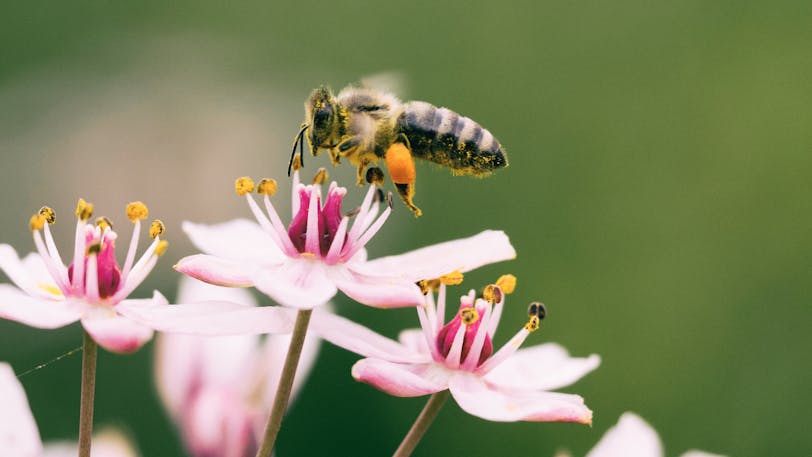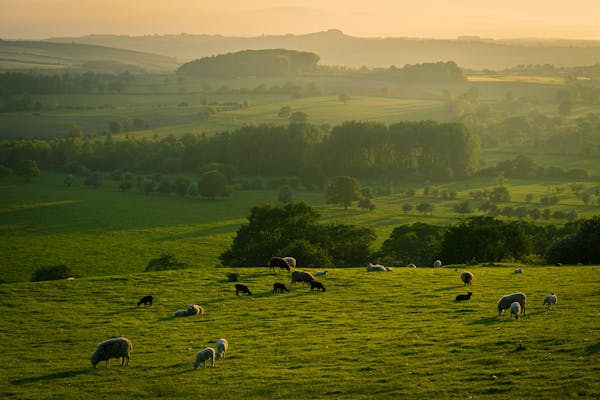The Sustainable Farming Incentive: Let’s Dig In
Food and drink is the UK’s largest manufacturing sector – and also one of the biggest carbon emitters. Nurturing more planet-friendly farming methods from the very root is crucial for tackling climate change. But how can farmers be supported in doing so? Read ahead to discover everything you need to know about the government's new Sustainable Farming Incentive.

Here at DriveElectric, we’re setting out to help our customers become more sustainable. That means adopting more than just electric vehicles: it’s our lifestyles as a whole that can help to make a truly long-lasting impact.
We believe that education and empowerment are key to driving this positive change - and when it comes to making greener choices in our everyday lives, the food we eat is a pretty tasty starting point.
In this blog, we’ll be covering:
- What is the Sustainable Farming Incentive?
- What is the Sustainable Farming Incentive Update 2023?
- How will the Sustainable Farming Incentive benefit farmers?
- Why is biodiversity important in agriculture?
The food and drink sector brings in a whopping £30 million to the economy every year. It also provides jobs for over 440,000 people across the UK. Safe to say, we’re incredibly lucky to have access to safe and nutritious produce every day. And yet, it is all too easy to take that for granted when we sweep the supermarket shelves.
Extreme weather conditions and the rise of inflation means the farming industry needs more support than ever before. Crop yields are suffering, soil quality is hindering, and livestock productivity is reducing. This not only impacts food security, but also the business of farmers - globally and nationally.

Agriculture is also said to be a significant contributor to global warming due to livestock emissions and chemical fertilisers releasing high levels of Co2 into the atmosphere. According to studies, it accounts for 25% of human induced global greenhouse gas emissions.
Climate change is impacting agriculture, and agriculture is impacting climate change. To help break this cycle here in the UK, the government has released a Sustainable Farming Incentive (SFI) to help farmers invest in the biotechnology they need to thrive.
What is the Sustainable Farming Incentive?
The SFI is the first of the three pillars under the government’s Environmental Land Management Scheme. The goal? To empower farmers across the UK to adapt to the new sustainable ways of operating, so we can achieve optimum biodiversity as a nation. The more of these techniques’ farmers adopt, the more they’ll be paid. Just think of it as a (really great) reward scheme.
Recent years have introduced several new farming support schemes over the last couple of years, including the Future Farming Resilience Fund and the Farming Investment Fund Grant. The SFI, however, is the one raising high hopes for the ways it can help farmers pave the way for a greener future.
From better water quality and more biodiversity right through to climate change mitigation of animal health and welfare, SFI is key for driving us towards our net zero targets.
What is the Sustainable Farming Incentive update in 2023?
Last year saw the introduction of 3 standards: the arable and horticultural standard, the improved grassland soil standard, and the moorland standard. After seeing great success from 2022, the government recently released 6 new standards that are now available to farmers to apply for. These go as follows:
-
Nutrient management standard
Farmers can get paid to analyse and report on their nutrient management, which can then help to guide their next steps on delivering optimum environmental impact.
-
Integrated pest management standard
Includes implementing an integrated pest management plan so that farmers can maintain flower-rich land (margins, blocks, or strips). The payment will also cover those who stop using insecticides.
-
Hedgerows standard
This involves paying farmers to reconsider and improve the condition of their hedgerows to make better homes for wildlife, all while boosting biodiversity.
-
Arable and horticultural land standard
A standard that requires nurturing and maintaining nectar-rich flower areas to ensure birds have access to food throughout the cooler months.
-
Improved grassland standard
Those who act in managing grassland in a way that promotes winter bird food and builds buffer strips will be rewarded/paid.
-
Low/no input grassland standard
Where farmers are paid to manage low input grassland, which can increase biodiversity, maintain soil quality, and improve water quality.
Thérèse Coffey, Secretary of State for Environment for Food and Rural Affairs, said:
Farmers are at the heart of our economy – producing the food on our tables as well as being the custodians of the land it comes from.These two roles go hand-in-hand, and we are speeding up the roll out of our farming schemes so that everyone can be financially supported as they protect the planet while producing food more sustainably.
How will the Sustainable Farming Incentive help farmers?
The food on our table (or laps if it’s a chippy tea) starts out on the first step of the food supply chain: production. Now, this process requires high-quality soil, clean water, and good weather conditions to thrive. With the impact of climate change impacting all three of those crucial factors, the need to help farmers fight back is essential for keeping the nation fed.
The SFI has been created specifically to help them pay for the farming methods that can deliver numerous environmental and sustainable benefits: from taking care of our natural environment and reducing carbon emissions right through to supporting the welfare of farmed animals.
Something as natural and organic as soil, for example, can help to keep pests at bay and form a protective shield for crops. Here’s just a few of the ways nature can step in to help farmers thrive:
-
Tackling the rise of inflation by boosting soil health
Just like the rest of us, farmers have also felt the tightening squeeze of the economy. Fertiliser, pesticide, and animal feed prices have risen, meaning more reliable sources need to be made available. The SFI will add organic matter as an alternative to improve the soil nutrients and fight pests. Plus, it can help to nurture a more diverse range of beneficial bacteria for the crops.
-
Address the impact of changing weather on crops
Dry weather conditions and extreme flooding has a knock-on effect on arable farms. With food insecurity and damaged crops continuing to unravel, it’s better soil health that can create a more robust soil structure that can absorb and hold water. This then offsets the effects of droughts and floods.
-
Increasing biodiversity and cultivating more yields
The UK is among one of the many countries that’s seen a dramatic decrease in crops as a result of global warming. Biodiversity is key for encouraging more crops, all while creating more homes for wildlife. The SFI will do this by planting more hedgerow trees, providing feed for wild birds, and planting more flowered areas for animals to inhabit in.
To find out who’s eligible for the SFI, head on over to GOV UK.
So, why is biodiversity so important?
Biodiversity, which encompasses pretty much all of nature, is vital for ecosystem functions such as providing us with healthy soil and supporting pollination. As our diets are based on animal proteins and plants, it ensures we have the resources we need to survive. Biodiversity provides us with access to good-quality food products, where the crops have been protected from pests and disease. All pretty important components for human health.
When it comes to biodiversity and agriculture, the benefits include:
-
Nurtures healthy, high-quality soil.
-
Creates safe habitats for wildlife to thrive.
-
Ensures cleaner, safer water.
-
Manages pest control.
-
Produces medical resources.
-
Improves farming productivity.
With today’s ever-increasing population, the demand for food continues to rise. This means more land is being needed to accommodate the agriculture stage of the food supply chain. While this may sound harmless enough, wildlife is being significantly impacted in the process. Improving biodiversity in farmland habitats is therefore particularly important, as it can help to increase ecosystem stability and withstand the impact of climate change, all while maintaining food security across the world.
Schemes such as the Sustainable Farming Incentive will help farmers to strike this balance between food productivity and planet protection.
Want to learn more about the food supply chain and how it relates to climate change?
Head on over here:
More guides
6 surprising things you didn’t know about electric vans

Understanding Vehicle Excise Duty (VED) or "Road Tax" for EVs
How to save money on a new car with Salary Sacrifice

How is salary sacrifice calculated?
Bee Photo by Aaron Burden on Unsplash
Landscape Photo by Illiya Vjestica on Unsplash